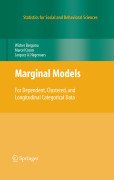
Marginal models: for dependent, clustered, and longitudinal categorical data
Bergsma, W.
Croon, M.
Hagenaars, J.A.
Marginal Models for Dependent, Clustered, and Longitudinal Categorical Data provides a comprehensive overview of the basic principles of marginal modeling and offers a wide range of possible applications. Marginal models are often the best choice for answering important research questions when dependent observations are involved, as the many real world examples in this book show. In thesocial, behavioral, educational, economic, and biomedical sciences, data are often collected in ways that introduce dependencies in the observations to be compared. For example, the same respondents are interviewed at several occasions, several members of networks or groups are interviewed within the same survey, or, within families, both children and parents are investigated. Statistical methods that take the dependencies in the data into account must then be used, e.g., when observations at time one and time two are compared in longitudinal studies. INDICE: Introduction.- Loglinear marginal models.- Nonloglinear marginal models.- Marginal analysis of longitudinal data.- Causal analysis: structural equation models and (quasi-)experimental designs.- Marginal modeling with latent variables.- Conclusions, extensions, applications.
- ISBN: 978-0-387-09609-4
- Editorial: Springer
- Encuadernacion: Cartoné
- Páginas: 274
- Fecha Publicación: 01/05/2009
- Nº Volúmenes: 1
- Idioma: Inglés
